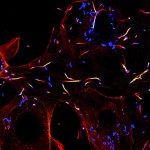Lien vers Pubmed [PMID] – 25326025
J. Immunol. 2014 Nov;193(10):5181-9
Intravenous Igs (IVIg) therapy is widely used as an immunomodulatory strategy in inflammatory pathologies and is suggested to promote cancer regression. Because progression of tumors depends on their ability to redirect the polarization state of tumor-associated macrophages (from M1/immunogenic/proinflammatory to M2/anti-inflammatory), we have evaluated whether IVIg limits tumor progression and dissemination through modulation of macrophage polarization. In vitro, IVIg inhibited proinflammatory cytokine production from M1 macrophages and induced a M2-to-M1 polarization switch on human and murine M2 macrophages. In vivo, IVIg modified the polarization of tumor-associated myeloid cells in a Fcεr1γ chain-dependent manner, modulated cytokine blood levels in tumor-bearing animals, and impaired tumor progression via FcγRIII (CD16), FcγRIV, and FcRγ engagement, the latter two effects being macrophage mediated. Therefore, IVIg immunomodulatory activity is dependent on the polarization state of the responding macrophages, and its ability to trigger a M2-to-M1 macrophage polarization switch might be therapeutically useful in cancer, in which proinflammatory or immunogenic functions should be promoted.
